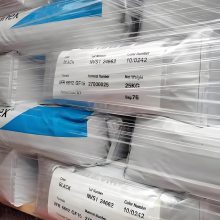
| �Ƿ���ڣ��� | ����(����)��ZG | �ƺţ� 2300 GV3/30 |
| ���۷�ʽ���Բ����� |
CELANEX 2300 GV3/30
CELANEX® PBT
PBT-GB30
Characteristics
Regional availability
North America
Europe
Asia Pacific
South and Central America
Near East/Africa
Global
Processing
Injection Moulding
Delivery form
Pellets
Additives
Release agent
Special characteristics
Heat stabilised or stable to heat
Product Text
Chemical abbreviation according to *** 1043-1: PBT Moulding compound *** 7792- PBT, MGHR, 08-040N, GB30 Polybutylene terephthalate, low warpage, 30 % glass beads. Flammability UL 94 HB minimum thickness 0.82 mm. Recognition by Underwriters Laboratories, USA (UL)
Product information
Value
Test Norm
Resin Identification
PBT-GB30
*** 1043
Part Marking Code
>PBT-GB30<
*** 11469
Rheological properties
Value
Unit
Test Norm
Melt volume-flow rate
14
cm³/10min
*** 1133
Temperature
250
°C
Load
2.16
kg
Moulding shrinkage range, parallel
1.4 - 1.9
%
*** 294-4, 2577
Moulding shrinkage range, normal
1.2 - 1.6
%
*** 294-4, 2577
Mechanical properties
Value
Unit
Test Norm
Tensile modulus
4200
MPa
*** 527-1/-2
Tensile stress at break, 5mm/min
52
MPa
*** 527-1/-2
Tensile strain at break, 5mm/min
3.3
%
*** 527-1/-2
Flexural modulus
4150
MPa
*** 178
Flexural strength
93
MPa
*** 178
Tensile creep modulus, 1h
3600
MPa
*** 899-1
Tensile creep modulus, 1000h
2500
MPa
*** 899-1
Charpy impact strength, 23°C
22
kJ/m²
*** 179/1eU
Charpy impact strength, -30°C
23
kJ/m²
*** 179/1eU
Charpy notched impact strength, 23°C
3.3
kJ/m²
*** 179/1eA
Charpy notched impact strength, -30°C
3.3
kJ/m²
*** 179/1eA
Ball indentation hardness, H 961/30
180
MPa
*** 2039-1
Poisson&#39;s ratio
0.36[C]
[C]: Calculated
Thermal properties
Value
Unit
Test Norm
Melting temperature, 10°C/min
225
°C
*** 11357-1/-3
Temperature of deflection under load, 1.8 MPa
90
°C
*** 75-1/-2
Temperature of deflection under load, 0.45 MPa
190
°C
*** 75-1/-2
Vicat softening temperature, 50°C/h 50N
195
°C
*** 306
Coefficient of linear thermal expansion (CLTE), parallel
100
E-6/K
*** 11359-1/-2
Flammability
Value
Unit
Test Norm
Burning Behav. at 1.5mm nom. thickn.
HB
class
IEC 60695-11-10
Thickness tested
1.6
mm
IEC 60695-11-10
Burning Behav. at thickness h
HB
class
IEC 60695-11-10
Thickness tested
0.82
mm
IEC 60695-11-10
UL recognition
yes
UL 94
Oxygen index
22
%
*** 4589-1/-2
Electrical properties
Value
Unit
Test Norm
Relative permittivity, 100Hz
4.6
IEC 62631-2-1
Relative permittivity, 1MHz
4.4
IEC 62631-2-1
Dissipation factor, 100Hz
90
E-4
IEC 62631-2-1
Dissipation factor, 1MHz
120
E-4
IEC 62631-2-1
Volume resistivity
>1E13
Ohm.m
IEC 62631-3-1
Surface resistivity
>1E15
Ohm
IEC 62631-3-2
Electric strength
28
kV/mm
IEC 60243-1
Comparative tracking index
250
IEC 60112
Physical/Other properties
Value
Unit
Test Norm
Humidity absorption, 2mm
0.15
%
Sim. to *** 62
Water absorption, 2mm
0.4
%
Sim. to *** 62
Density
1550
kg/m³
*** 1183
Injection
Value
Unit
Drying Recommended
yes
Drying Temperature
120
°C
Drying Time, Dehumidified Dryer
4
h
Processing Moisture Content
≤0.04
%
Melt Temperature Optimum
250
°C
Min. melt temperature
240
°C
Max. melt temperature
260
°C
Screw tangential speed
0.1 - 0.3
m/s
Mold Temperature Optimum
80
°C
Min. mould temperature
60
°C
Max. mould temperature
130
°C
Additional information
Injection molding
Preprocessing
To avoid hydrolytic degradation during processing, CELANEX resins have to be dried to a moisture level equal to or less than 0,02%. The drying should be done in a dry-air dryer (dew point <-30°C) with a temperature of 120 to 140 °C and a drying time of 2 to 4 hours. In case of longer residence times in the dry-air dryer, the temperature should be reduced to 100°C.
The time between drying and processing should be kept as short as possible. The processing machine feed hopper should be closed during the processing operation.
Processing
Melt Temperature 260-270 °C
Mold Temperature *) 75-85 °C
Maximum Barrel Residence Time **) 5-10 min
Injection Speed fast
Peripheral screw speed max.0,3 m/sec
Back Pressure 10-30 bar
Injection Pressure 600-1000 bar
Holding Pressure 400-800 bar
Nozzle Design open design preferred
Injection speed, injection pressure and holding pressure have to be optimized to the individual article geometry. To avoid material degradation during processing low back pressure and minimum screw speed have to be used. Overheating of the material has to be avoided. For grades containing flame retardants, a maximum temperature of 265 °C should not be exceeded.
Celanese recommends only externally heated hot runner systems.
*) For moulded parts with especially high requirements to the surface quality or dimensional stability, a mold temperature of up to 110 °C can be advantageous.
**) If the cylinder temperatures are higher than the recommended maximum temperatures, the max. residence time in the barrel has to be reduced.
Processing Notes
Pre-Drying
CELANEX should in principle be predried. Because of the necessary low maximum residual moisture content the use of dry air dryers is recommended. The dew point should be =<- 30° C. The time between drying and processing should be as short as possible.
Storage
For subsequent storage of the material in the dryer until processed (<= 60 h) it is necessary to lower the temperature to 100° C.
Diagrams
CELANEX® 2300 GV3/30
Pa.s





��ݸ�оۺ��ܻ�����˾ �ֻ���𐂮𐂯𐂰𐂱𐂰𐂲𐂳𐂯𐂴𐂵𐂲 ��ַ���㶫 ��ݸ ��ľͷ�� ��ݸ����ľͷ���������85-1���ܽ��������Ķ���9��32��